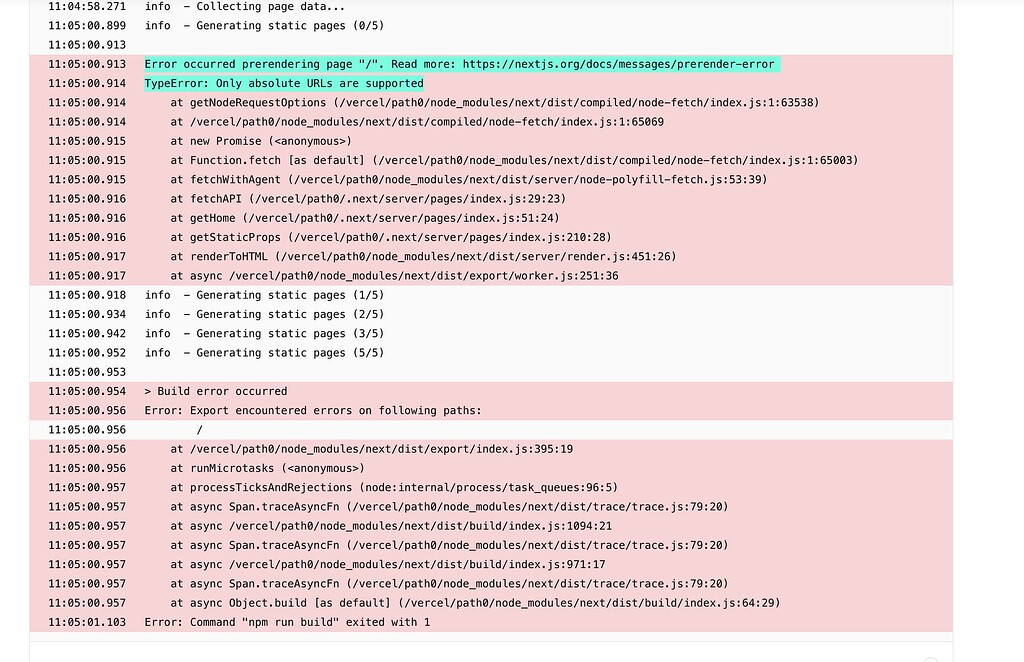Next.js Absolute URLs Required
Learn how to resolve the "Error: only absolute urls are supported" in Next.js, explore common causes and solutions for both internal and external URLs.
Learn how to resolve the "Error: only absolute urls are supported" in Next.js, explore common causes and solutions for both internal and external URLs.
Next.js developers often encounter the frustrating "Only absolute URLs are supported" error, typically during data fetching, API routes, or redirects. This guide will help you identify the root cause and implement the appropriate solution. We'll explore various scenarios, including data fetching methods, API route handling, redirects, and external library usage. By understanding the context and applying the recommended fixes, you'll be able to overcome this error and ensure smooth URL handling in your Next.js applications.
This error commonly arises when dealing with URLs in Next.js, particularly during data fetching, API routes, or redirects. Let's explore the potential causes and solutions step-by-step:
1. Identify the Context:
getStaticProps, getServerSideProps, or getInitialProps?pages/api directory?NextResponse.redirect in Middleware or API routes?node-fetch?2. Common Causes and Solutions:
a) Relative URLs in Data Fetching:
// Incorrect (relative URL)
const res = await fetch('/api/data');
// Correct (absolute URL)
const res = await fetch('https://yourdomain.com/api/data');b) Relative URLs in API Routes:
absoluteUrl utility from next/dist/server/router.// Incorrect (relative redirect)
res.redirect('/login');
// Correct (absolute redirect)
res.redirect('https://yourdomain.com/login');
// Correct (using absoluteUrl utility)
import { absoluteUrl } from 'next/dist/server/router';
const url = absoluteUrl('/login', req);
res.redirect(url);c) Relative URLs in Middleware Redirects:
NextResponse.redirect in Middleware.// Incorrect (relative redirect)
return NextResponse.redirect('/dashboard');
// Correct (absolute redirect)
return NextResponse.redirect('https://yourdomain.com/dashboard');d) External Libraries and Relative Paths:
node-fetch might not handle relative paths as expected.3. Additional Tips:
4. Specific Scenarios:
By following these steps and understanding the context of the error, you should be able to effectively resolve the "Only absolute URLs are supported" issue in your Next.js application.
This code provides JavaScript solutions for the "Only absolute URLs are supported" error in Next.js. It covers data fetching with absolute URLs using getStaticProps, API routes with absolute URLs and the absoluteUrl utility, middleware redirects with absolute URLs, handling external libraries like node-fetch, and using environment variables for API URLs. The code emphasizes the importance of absolute URLs and suggests error handling, URL building, and testing.
Here's how you can implement the solutions mentioned in the article using JavaScript:
1. Data Fetching with Absolute URLs:
// Example using getStaticProps
export async function getStaticProps() {
const res = await fetch('https://api.example.com/data'); // Absolute URL
const data = await res.json();
return {
props: { data },
};
}2. API Routes with Absolute URLs and absoluteUrl Utility:
// pages/api/redirect.js
import { absoluteUrl } from 'next/dist/server/router';
export default function handler(req, res) {
// Absolute redirect
// res.redirect('https://yourdomain.com/login');
// Using absoluteUrl utility
const url = absoluteUrl('/login', req);
res.redirect(url);
}3. Middleware Redirects with Absolute URLs:
// middleware.js
import { NextResponse } from 'next/server';
export function middleware(req) {
// Check conditions for redirect
if (req.nextUrl.pathname === '/') {
return NextResponse.redirect(new URL('/dashboard', req.url)); // Absolute URL
}
}4. Handling External Libraries:
// Example with node-fetch
import fetch from 'node-fetch';
const res = await fetch('https://api.example.com/data'); // Absolute URL5. Using Environment Variables:
// .env.local
NEXT_PUBLIC_API_URL=https://api.example.com
// In your code
const res = await fetch(process.env.NEXT_PUBLIC_API_URL + '/data');Additional Considerations:
Remember: Always use absolute URLs when dealing with data fetching, API routes, redirects, and external libraries in Next.js to avoid the "Only absolute URLs are supported" error.
Dynamic Routes and Absolute URLs:
router.push method or by manually building the URL string with the appropriate domain and path.Server-Side Rendering (SSR) and Client-Side Rendering (CSR):
Custom Server Implementations:
Edge Cases and Workarounds:
Testing and Debugging Strategies:
Community Resources and Support:
By considering these additional notes and carefully analyzing your application's URL handling, you can effectively prevent and resolve the "Only absolute URLs are supported" error, ensuring a robust and reliable Next.js development experience.
| Context | Problem | Solution |
|---|---|---|
Data Fetching (getStaticProps, getServerSideProps, getInitialProps) |
Using relative URLs to fetch data from external or internal APIs. | Always use absolute URLs (e.g., https://yourdomain.com/api/data). |
| API Routes | Using relative URLs for redirects or data fetching within API routes. | Use absolute URLs or the absoluteUrl utility from next/dist/server/router. |
| Middleware Redirects | Using relative URLs with NextResponse.redirect in Middleware. |
Always provide absolute URLs for redirects. |
External Libraries (e.g., node-fetch) |
Libraries might not handle relative paths correctly. | Ensure you pass absolute URLs to such libraries. |
In conclusion, the "Only absolute URLs are supported" error in Next.js often stems from using relative URLs in contexts like data fetching, API routes, or redirects. To resolve this, consistently use absolute URLs, ensuring they include the full domain and path. Leverage tools like the absoluteUrl utility and environment variables for managing URLs effectively. Consider the nuances of dynamic routes, SSR/CSR, and custom server setups. Implement thorough testing and debugging strategies to catch and address URL-related issues. By understanding the causes and solutions, you can ensure smooth URL handling and a robust Next.js development experience.
 Netlify Dev - TypeError: Only absolute URLs are supported - Support ... | I am using Nuxt. For a new feature I need to start using Netlify functions. In order to run everything locally I started using the Netlify CLI. With running the “netlify dev” command the CLI understands that I am using Nuxt and starts a server on http://localhost:8888/ and the nuxt default client on http://localhost:3000/ Starting Netlify Dev with Nuxt 2 > project@1.0.0 dev > nuxt ℹ Parsed 7 files in 1,2 seconds ℹ Listening on: http://localhost:3000/ ℹ Preparing project for development ℹ Ini...
Netlify Dev - TypeError: Only absolute URLs are supported - Support ... | I am using Nuxt. For a new feature I need to start using Netlify functions. In order to run everything locally I started using the Netlify CLI. With running the “netlify dev” command the CLI understands that I am using Nuxt and starts a server on http://localhost:8888/ and the nuxt default client on http://localhost:3000/ Starting Netlify Dev with Nuxt 2 > project@1.0.0 dev > nuxt ℹ Parsed 7 files in 1,2 seconds ℹ Listening on: http://localhost:3000/ ℹ Preparing project for development ℹ Ini... Vercel / NextJS Error Prerendering index. "Only absolute URLs are ... | Hi there. When trying to deploy my DatoCMS project on Vercel, I keep getting an error that it won’t accept absolute links. In my dev environment, there are zero errors after running npm run-script build. Here’s my repo: GitHub - kr1st1nagr03g3r/honey-shark . Any ideas why this isn’t working? I’ve scrubbed my entire build for absolute links… My components and every page. I’ve followed the links in the errors as well with no luck. Thanks! I’ve tried deleting node_modules and package-lock.json...
Vercel / NextJS Error Prerendering index. "Only absolute URLs are ... | Hi there. When trying to deploy my DatoCMS project on Vercel, I keep getting an error that it won’t accept absolute links. In my dev environment, there are zero errors after running npm run-script build. Here’s my repo: GitHub - kr1st1nagr03g3r/honey-shark . Any ideas why this isn’t working? I’ve scrubbed my entire build for absolute links… My components and every page. I’ve followed the links in the errors as well with no luck. Thanks! I’ve tried deleting node_modules and package-lock.json... Issues with Loading GLB with react-three-fiber and next js - Questions | Hey guys, I am attempting to load a glb model into a react (next js with TypeScript) application and display it. When I preview the 3d model in an online viewer I get this: All seems fine. When I attempt to load the model in my app, it either seems to be misshapen, or its missing meshes. Here are some examples, the first one was my first attempt, the second I tried adjusting some things in the code and it went worse… To load my model in, I first converted my GLB to a TSX using this t...
Issues with Loading GLB with react-three-fiber and next js - Questions | Hey guys, I am attempting to load a glb model into a react (next js with TypeScript) application and display it. When I preview the 3d model in an online viewer I get this: All seems fine. When I attempt to load the model in my app, it either seems to be misshapen, or its missing meshes. Here are some examples, the first one was my first attempt, the second I tried adjusting some things in the code and it went worse… To load my model in, I first converted my GLB to a TSX using this t... Getting the response of a API call - Queries and Resources - Retool ... | First time retool user here — how do I get the result of a POST call? The API I'm using populates the Location field on the header on the response object, but when I try to use query1.headers.location (specifically, I'm trying to show the result of the call in another Retool component), it's accessing the header on the original query, not on the response. Thanks!
Getting the response of a API call - Queries and Resources - Retool ... | First time retool user here — how do I get the result of a POST call? The API I'm using populates the Location field on the header on the response object, but when I try to use query1.headers.location (specifically, I'm trying to show the result of the call in another Retool component), it's accessing the header on the original query, not on the response. Thanks!